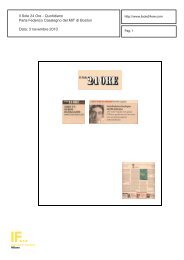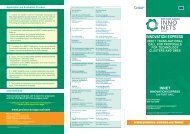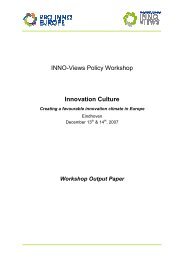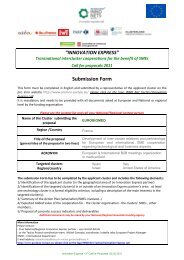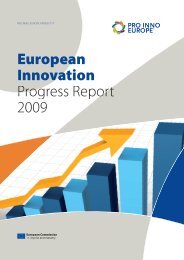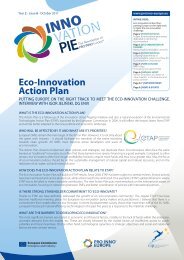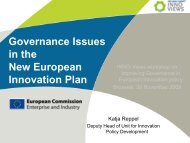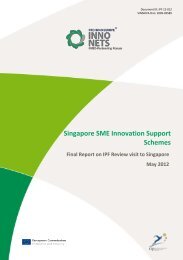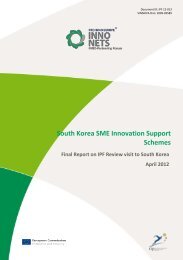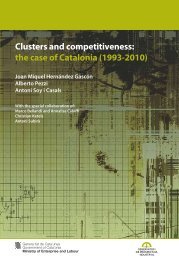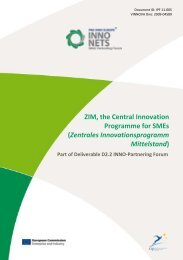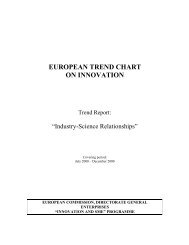Benchmarking National - PRO INNO Europe
Benchmarking National - PRO INNO Europe
Benchmarking National - PRO INNO Europe
You also want an ePaper? Increase the reach of your titles
YUMPU automatically turns print PDFs into web optimized ePapers that Google loves.
74<br />
BENCHMARKING NATIONAL AND REGIONAL SUPPORT SERVICES FOR SMES IN THE FIELD OF INTELLECTUAL AND INDUSTRIAL <strong>PRO</strong>PERTY<br />
The campaign “What is the key?”<br />
“What is the key?” (abbreviated WITK in the following) is an IPR awareness<br />
raising campaign organised and run by the UK Intellectual Property Office<br />
(UKIPO) in partnership with national and local authorities. Its objective is to<br />
offer an overview of the law relating to IPRs, to show their importance to<br />
businesses and how they are relevant to companies of any size. The purpose<br />
of the campaign is to make businesses, especially SMEs, more aware of their<br />
intellectual assets and their potential and to offer information and support on<br />
how to protect them. WITK can be seen as an “information day”, set up as a<br />
two-part IPR event: during the first part, a short introduction to intellectual<br />
property rights covering patents, trade marks, designs and copyright is given<br />
to inform the interested audience about recent developments and available<br />
public support services. Depending on where this event is presented, local<br />
service providers are also invited to talk about their support services<br />
concerning legal protection of IP. The second part of such an event presents<br />
case studies which describe and illustrate how (local) entrepreneurs benefited<br />
from using IPR to protect their intellectual assets. Panel discussions and open<br />
question/answer sessions are offered at the end of each event. The programme<br />
is managed in collaboration with the Chartered Institute of Patent Agents<br />
(CIPA) and the Institute of Trade Mark Attorneys (ITMA), thus including also<br />
relevant service providers from the private sector. Events to promote the<br />
programme have been held all over the UK in co-operation with local partners<br />
such as Business Link Offices and regional development agencies, which<br />
underlines the regional character and dimension of WITK.<br />
� Open days: Two forms of open days were mainly observed in the context of<br />
the underlying benchmarking study: (i) Open days, where the IPR serviceproviding<br />
organisation allows free access to its premises and informs visitors<br />
about aspects related to IPR; often, such open days are accompanied by an<br />
exhibition where at different booths information on IPR-related subjects is<br />
displayed. (ii) Open days, where patent attorneys make a short presentation<br />
on (mostly legal) aspects linked to IPR and answer questions from the audience.<br />
The latter type of open days is generally organised by service-providing<br />
organisations which usually do not operate IPR services in-house (see also<br />
section 5.4.3).<br />
� Publications: Brochures and websites: The creation of brochures on different<br />
aspects of IPR and/or presentation of such information on a website (e.g., for<br />
download but also in a more interactive manner) seem to be strong activity<br />
fields, especially for many patent offices. 17 An example is the LIIP (Linking<br />
Innovation and Industrial Property) publication by the Technology Watch<br />
Centre of Henri Tudor in Luxemburg (an outcome of an international<br />
cooperation involving Spanish, Luxemburgish, Irish, Italian and Greek<br />
organisations (mostly patent offices)) which provides 10 pragmatic<br />
recommendations for SMEs “…highlighting the importance of IP to companies´<br />
business strategies” (LIIP, 2003: 4). Another example is a series of three<br />
information booklets published by the Czech Industrial Property Office in<br />
English and Czech language on trade marks, designs and the protection of<br />
technical solutions. With respect to websites, a noteworthy example would be<br />
the IP Toolkit offered via the website of the Canadian Institute for Intellectual<br />
Property (CIPO) which includes extensive awareness-raising materials (e.g.,<br />
brochures and interactive learning guides) with respect to IPR (see also Graph<br />
18).<br />
17 Though the study focuses on national offerings, it should nonetheless be mentioned that WIPO (http://www.wipo.<br />
int/sme/en) and the EPO (http://www.epo.org/focus/innovation-and-economy/sme-case-studies.html) provide<br />
extensive material of this kind, too.



